Confronting the subject of prophecy today
is rather like looking at wreckage after a shipwreck.
— Archbishop Rino Fisichella,
“Prophecy” in Dictionary of Fundamental Theology, p. 788
As the world draws closer and closer to the end of this age, prophecy is becoming more frequent, more direct, and even more specific. But how do we respond to the more sensational of Heaven’s messages? What do we do when seers feel “off” or their messages simply don’t resonate?
The following is a guide for new and regular readers in the hopes to provide balance on this delicate subject so that one can approach prophecy without anxiety or fear that one is somehow being misled or deceived.
The Rock
The most crucial thing to remember, always, is that prophecy or so-called “private revelation” does not supplant the Public Revelation handed on to us through Scripture and Sacred Tradition, and safeguarded through apostolic succession.[1]cf. The Fundamental Problem, The Chair of Rock, and The Papacy is not One Pope All that is needed for our salvation has already been revealed:
Throughout the ages, there have been so-called “private” revelations, some of which have been recognized by the authority of the Church. They do not belong, however, to the deposit of faith. It is not their role to improve or complete Christ’s definitive Revelation, but to help live more fully by it in a certain period of history. Guided by the Magisterium of the Church, the sensus fidelium knows how to discern and welcome in these revelations whatever constitutes an authentic call of Christ or his saints to the Church. —Catechism of the Catholic Church, n. 67
Unfortunately, some Catholics have misinterpreted this teaching to mean that we do not, therefore, have to listen to private revelation. That is false and, in fact, a careless interpretation of Church teaching. Even controversial theologian, Fr. Karl Rahner, once asked…
…whether anything God reveals can be unimportant. —Visions and Prophecies, p. 25
And theologian Hans Urs von Balthasar said:
One can therefore simply ask why God provides [revelations] continuously [in the first place if] they hardly need to be heeded by the Church. —Mistica oggettiva, n. 35
Wrote Cardinal Joseph Ratzinger:
…the place of prophecy is eminently the place God reserves for Himself to intervene personally and anew each time, taking the initiative…. through charisms, [He] reserves for himself the right to intervene directly in the Church to awaken it, warn it, promote it and sanctify it. —“Das Problem der Christlichen Prophetie,” 181; cited in Christian Prophecy: The Post-Biblical Tradition, by Hvidt, Niels Christian, p. 80
Hence, Pope Benedict XIV taught:
One may refuse assent to “private revelation” without direct injury to Catholic Faith, as long as he does so, “modestly, not without reason, and without contempt.” —Heroic Virtue, p. 397
Let me stress that: not without reason. While Public Revelation contains all that we need for our salvation, it does not necessarily reveal all that we need for our sanctification, especially at certain periods in salvation history. Put another way:
…no new public revelation is to be expected before the glorious manifestation of our Lord Jesus Christ. Yet even if Revelation is already complete, it has not been made completely explicit; it remains for Christian faith gradually to grasp its full significance over the course of the centuries. —Catechism of the Catholic Church, n. 67
Just as a flower in its bud form is still the same flower as when it has bloomed, so too, Sacred Tradition has attained new beauty and depth 2000 years later after having bloomed throughout the centuries. Prophecy, then, does not add petals to the flower, but often unfolds them, releasing new fragrances and pollen — that is, fresh insights and graces for the Church and the world. For example, the messages given to St. Faustina add nothing to the Public Revelation that Christ is mercy and love itself; rather, they impart deeper insights into the depth of that mercy and love, and how to more practically acquire them through trust. Likewise, the sublime messages imparted to Servant of God Luisa Piccarreta do not improve or complete Christ’s definitive Revelation, but draw the attentive soul into the mystery of the Divine Will already spoken of in Scripture, but granting deeper insight into its fecundity, power, and centrality in the plan of salvation.[2]cf. The Divine Footnotes
This is all to say, then, that when you read the messages here on Countdown to the Kingdom, the first litmus test is whether or not the messages are in harmony with Sacred Tradition. (Hopefully, we as a team have properly vetted all the messages in this regard, though the final discernment ultimately belongs to the Magisterium.)
Listening, Not Despising
The second thing to point out from n. 67 of the Catechism is that it states that “some” private revelations have been recognized by the authority of the Church. It does not say “all” or even that they “must” be officially recognized, though that would be the ideal. All too frequently I hear Catholics say, “That seer isn’t approved. Stay away!” But neither Scripture nor the Church herself teaches that.
Two or three prophets should speak, and the others discern. But if a revelation is given to another person sitting there, the first one should be silent. For you can all prophesy one by one, so that all may learn and all be encouraged. Indeed, the spirits of prophets are under the prophets’ control, since he is not the God of disorder but of peace. (1 Cor 14:29-33)
While this can often be practiced on the spot regarding the regular exercise of prophecy in a community, when supernatural phenomena are accompanied, a deeper investigation by the Church into the supernatural character of such revelations may be necessary. This may or may not take some time.
Today, more than in the past, news of these apparitions is diffused rapidly among the faithful thanks to the means of information (mass media). Moreover, the ease of going from one place to another fosters frequent pilgrimages, so that Ecclesiastical Authority should discern quickly about the merits of such matters.
On the other hand, modern mentality and the requirements of critical scientific investigation render it more difficult, if not almost impossible, to achieve with the required speed the judgments that in the past concluded the investigation of such matters (constat de supernaturalitate, non constat de supernaturalitate) and that offered to the Ordinaries the possibility of authorizing or prohibiting public cult or other forms of devotion among the faithful. — Sacred Congregation for the Doctrine of the Faith, “Norms Regarding the Manner of Proceeding in the Discernment of Presumed Apparitions or Revelations” n. 2, vatican.va
The revelations to St. Juan Diego, for instance, were approved on the spot as the miracle of the tilma took place before the bishop’s eyes. On the other hand, despite the “miracle of the sun” witnessed by tens of thousands that confirmed Our Lady’s words at Fatima, Portugal, the Church took thirteen years to approve the apparitions — and then several more decades after that before the “consecration of Russia” was supposedly made (and even then, some dispute whether it was done properly since Russia was not explicitly mentioned in John Paul II’s “Act of Entrustment”. See Did the Consecration of Russia Happen?)
Here’s the point. In Guadalupe, the bishop’s approval of the apparitions immediately paved the way for millions of conversions in that country in the years to follow, essentially putting an end to the culture of death and human sacrifice there. However, the delay or non-response of the hierarchy with Fatima objectively resulted in World War II and the spread of Russia’s “errors” —Communism— that has not only claimed tens of millions of lives all over the world, but is now positioned through The Great Reset to be implemented
globally. [3]cf. Isaiah’s Prophecy of Global Communism
Two things can be observed from this. One is that “not yet approved” does not mean “condemned.” This is a common and serious mistake among many Catholics (primarily because there is virtually no catechesis on prophecy from the pulpit). There could be a number of reasons why certain private revelations have not been officially recommended as worthy of belief (which is what “approved” means): the Church may still be discerning them; the seer(s) may still be alive, and hence, a decision is deferred while revelations are ongoing; the bishop may simply have not initiated a canonical review and/or may have no plans to do so, which is his prerogative. None of the above is necessarily a declaration that an alleged apparition or revelation is constat de non supernaturalitate (ie. not supernatural in origin or lacking signs manifesting it to be so).
Second, it is clear that Heaven doesn’t wait for canonical investigations. Usually, God provides sufficient evidence for belief in messages that are especially intended for a larger audience. Hence, Pope Benedict XIV said:
Are they to whom a revelation is made, and who are certain it comes from God, bound to give a firm assent thereto? The answer is in the affirmative… —Heroic Virtue, Vol III, p.390
As for the rest of the Body of Christ, he goes on to say:
He to whom that private revelation is proposed and announced, ought to believe and obey the command or message of God, if it be proposed to him on sufficient evidence… For God speaks to him, at least by means of another, and therefore requires him to believe; hence it is, that he is bound to believe God, Who requires him to do so. —Ibid. p. 394
When God speaks, He expects us to listen. When we don’t, there can be catastrophic consequences (read Why the World Remains in Pain). On the other hand, when we do obey Heaven’s revelations based on “sufficient evidence”, the fruits can last for generations (read When They Listened).
All that said, if a bishop gives directives to his flock that are binding on their consciences, we must always obey them as “he is not the God of disorder but of peace.”
But How Do We Know?
If the Church has not begun or concluded an investigation, what is “sufficient evidence” for one person may not be so for another. Of course, there will always be those who are so cynical, so skeptical toward anything supernatural, that they would not believe were Christ to raise the dead before their very eyes.[4]cf. Mark 3:5-6 But here, I am speaking about those who recognize that an alleged seer’s messages may not contradict Catholic teaching, but who still wonder if said revelations are truly supernatural in origin, or simply the fruit of the seer’s imagination?
St. John of the Cross, himself a recipient of divine revelations, warned against self-delusion:
I am appalled at what happens in these days—namely, when some soul with the very smallest experience of meditation, if it be conscious of certain locutions of this kind in some state of recollection, at once christens them all as coming from God, and assumes that this is the case, saying: “God said to me…”; “God answered me…”; whereas it is not so at all, but, as we have said, it is for the most part they who are saying these things to themselves. And, over and above this, the desire which people have for locutions, and the pleasure which comes to their spirits from them, lead them to make answer to themselves and then to think that it is God Who is answering them and speaking to them. —St. John of the Cross, The Ascent of Mount Carmel, Book 2, Chapter 29, n.4-5
So yes, this is very possible and probably more frequent than not, which is why supernatural phenomena like the stigmata, miracles, conversions, etc. are considered by the Church as further proof of claims to supernatural origin.[5]The Sacred Congregation for the Doctrine of the Faith specifically refers to the importance that such a phenomenom in fact “…bear fruits by which the Church herself might later discern the true nature of the facts…” —Ibid. n. 2, vatican.va
But St. John’s warnings are not a cause to fall into another temptation: fear — fear that everyone who claims to hear from the Lord is “deceived” or a “false prophet.”
It is tempting for some to regard the entire genre of Christian mystical phenomena with suspicion, indeed to dispense with it altogether as too risky, too riddled with human imagination and self-deception, as well as the potential for spiritual deception by our adversary the devil. That is one danger. The alternate danger is to so unreservedly embrace any reported message that seems to come from the supernatural realm that proper discernment is lacking, which can lead to the acceptance of serious errors of faith and life outside of the Church’s wisdom and protection. According to the mind of Christ, that is the mind of the Church, neither of these alternative approaches—wholesale rejection, on the one hand, and undiscerning acceptance on the other—is healthy. Rather, the authentic Christian approach to prophetic graces should always follow the dual Apostolic exhortations, in the words of St. Paul: “Do not quench the Spirit; do not despise prophecy,” and “Test every spirit; retain what is good” (1 Thess 5:19-21). —Dr. Mark Miravalle, Private Revelation: Discerning with the Church, p.3-4
In fact, every single baptized Christian is him or herself expected to prophesy to those around them; first, by their witness; second, by their words.
The faithful, who by Baptism are incorporated into Christ and integrated into the People of God, are made sharers in their particular way in the priestly, prophetic, and kingly office of Christ…. [who] fulfills this prophetic office, not only by the hierarchy… but also by the laity. He accordingly both establishes them as witnesses and provides them with the sense of the faith [sensus fidei] and the grace of the word. —Catechism of the Catholic Church, 897, 904
On this point, it should be kept in mind that prophecy in the biblical sense does not mean to predict the future but to explain the will of God for the present, and therefore show the right path to take for the future. —Cardinal Ratzinger (POPE BENEDICT XVI), “Message of Fatima”, Theological Commentary, www.vatican.va
Still, one has to distinguish between the “prophetic office” inherent to all believers, and the “prophetic gift” — the latter being a specific charism for prophecy, as mentioned in 1 Corinthians 12:28, 14:4, etc. This may take the form of words of knowledge, interior locutions, audible locutions, or visions and apparitions.
Sinners, Saints, and Seers
Now, such souls are chosen by God according to His designs — not necessarily because of their state of holiness.
…union with God by charity is not requisite in order to have the gift of prophecy, and thus it was at times bestowed even upon sinners; that prophecy was never habitually possessed by any mere man… —POPE BENEDICT XIV, Heroic Virtue, Vol. III, p. 160
Hence, another common mistake among the faithful is to expect seers to be saints. In reality, they are sometimes great sinners (like St. Paul) who in being knocked off of their high horses come to be a sign in themselves that authenticates their message, giving glory to God.
Another common mistake is to expect all seers to speak in the same manner, or rather, for Our Lady or Our Lord to “sound” the same way through each visionary. I’ve often heard people say  that this or that apparition doesn’t sound like Fatima and, therefore, must be false. However, just as each stained glass window in a Church casts different shades and colors of light, so too, the light of revelation refracts differently through each seer — through their individual senses, memory, imagination, intellect, reason, and vocabulary. Thus, Cardinal Ratzinger rightly said that we should not think of apparitions or locutions as if it were “heaven appearing in its pure essence, as one day we hope to see it in our definitive union with God.” Rather, the revelation imparted is often a compression of time and place into a single image that is “filtered” by the visionary.
that this or that apparition doesn’t sound like Fatima and, therefore, must be false. However, just as each stained glass window in a Church casts different shades and colors of light, so too, the light of revelation refracts differently through each seer — through their individual senses, memory, imagination, intellect, reason, and vocabulary. Thus, Cardinal Ratzinger rightly said that we should not think of apparitions or locutions as if it were “heaven appearing in its pure essence, as one day we hope to see it in our definitive union with God.” Rather, the revelation imparted is often a compression of time and place into a single image that is “filtered” by the visionary.
…the images are, in a manner of speaking, a synthesis of the impulse coming from on high and the capacity to receive this impulse in the visionaries…. Not every element of the vision has to have a specific historical sense. It is the vision as a whole that matters, and the details must be understood on the basis of the images taken in their entirety. The central element of the image is revealed where it coincides with what is the focal point of Christian “prophecy” itself: the centre is found where the vision becomes a summons and a guide to the will of God. —Cardinal Ratzinger (POPE BENEDICT XVI), Message of Fatima, Theological Commentary, www.vatican.va
I also frequently hear some protest that “all we need is Fatima.” Heaven obviously disagrees. There are many flowers in God’s garden and for a reason: some people prefer lilies, others roses, and yet others, tulips. Hence, some will prefer one seer’s messages over another for the simple reason that they are the particular “fragrance” their life needs at that time. Some people need a gentle word; others need a strong word; others prefer theological insights, others, more pragmatic — yet all come from the same Light.
What we can’t expect, however, is infallibility.
It may come as a shock to some that nearly all mystical literature contains grammatical errors (form) and, on occasion, doctrinal errors (substance). —Rev. Joseph Iannuzzi, mystical theologian, Newsletter, Missionaries of the Holy Trinity, January-May 2014
Such occasional occurrences of flawed prophetic habit should not lead to the condemnation of the entire body of the supernatural knowledge communicated by the prophet, if it is properly discerned to constitute authentic prophecy. —Dr. Mark Miravalle, Private Revelation: Discerning With the Church, page 21
Indeed, the spiritual director to both Servant of God Luisa Piccarreta and the seer of La Salette, Melanie Calvat, warned:
Conforming to prudence and sacred accuracy, people cannot deal with private revelations as if they were canonical books or decrees of the Holy See… For example, who could ratify in full all the visions of Catherine Emmerich and St. Brigitte, which show evident discrepancies? —St. Hannibal, in a letter to Fr. Peter Bergamaschi who had published all the unedited writings of Benedictine mystic, St. M. Cecilia
So clearly, these discrepancies have not constituted for the Church a reason to declare these saints “false prophets,” but rather, fallible humans and “earthen vessels.”[6]cf. 2 Cor 4:7 Thus, there is another flawed assumption many Christians have made that, if a prophecy does not come true, the seer must be a “false prophet.” They base this on the Old Testament decree:
If a prophet presumes to speak a word in my name that I have not commanded, or speaks in the name of other gods, that prophet shall die. Should you say to yourselves, “How can we recognize that a word is one the LORD has not spoken?”, if a prophet speaks in the name of the LORD but the word does not come true, it is a word the LORD did not speak. The prophet has spoken it presumptuously; do not fear him. (Deut 18:20-22)
However, were one to take this passage as an absolute maxim, then Jonah would be considered a false prophet since his “Forty days more and Nineveh shall be overthrown” warning was delayed.[7]Jonah 3:4, 4:1-2 In fact, the approved revelations of Fatima also present an incongruity. Within the Second Secret of Fatima, Our Lady said:
The war is going to end: but if people do not cease offending God, a worse one will break out during the Pontificate of Pius XI. —The Message of Fatima, vatican.va
But as Daniel O’Connor pointed out in his blog, “World War II did not start until September 1939, when Germany invaded Poland. But Pius XI died (thus, his Pontificated ended) seven months earlier: on February 10, 1939… It is a fact that World War II did not explicitly break out until the pontificate of Pius XII.” This is all to say that Heaven doesn’t always see how we see nor act how we would expect, and thus can and will move the goalposts if that is what will save the most souls, and/or postpone judgment (on the other hand, what constitutes the “beginning” of an event is not always evident on the human plane, and thus, the beginning of the war with Germany may indeed have had its “break out” during Pius XI’s reign.)
The Lord does not delay his promise, as some regard “delay,” but he is patient with you, not wishing that any should perish but that all should come to repentance. (2 Peter 3:9)
Walking With the Church
All of these nuances are why it is so necessary for the shepherds of the Church to be involved in the discernment process of prophecy.
Those who have charge over the Church should judge the genuineness and proper use of these gifts through their office, not indeed to extinguish the Spirit, but to test all things and hold fast to what is good. —Second Vatican Council, Lumen Gentium, n. 12
Historically, however, that has not always been the case. The “institutional” and “charismatic” aspects of the Church have often been in tension with one another — and the cost is not little.
The widespread reluctance on the part of many Catholic thinkers to enter into a profound examination of the apocalyptic elements of contemporary life is, I believe, part of the very problem which they seek to avoid. If apocalyptic thinking is left largely to those who have been subjectivized or who have fallen prey to the vertigo of cosmic terror, then the Christian community, indeed the whole human community, is radically impoverished. And that can be measured in terms of lost human souls. –Author, Michael D. O’Brien, Are We Living In Apocalyptic Times?
Using the guidelines below, it is my hope that many of the clergy and laity reading these words will find new ways to co-operate in the discernment of prophetic revelations; to approach them in a spirit of confidence and freedom, prudence and gratitude. For as St. John Paul II taught:
The institutional and charismatic aspects are co-essential as it were to the Church’s constitution. They contribute, although differently, to the life, renewal and sanctification of God’s People. —Speech to the World Congress of Ecclesial Movements and New Communities, www.vatican.va
As the world continues to fall into darkness and the change of eras approaches, we can expect that the messages of the seers are going to become more specific. That will test, edify, and even startle us. In fact, several seers throughout the world — from Medjugorje to California to Brazil and elsewhere — have claimed to have been given “secrets” that are to unfold before the world at a certain point in time. Like the “miracle of the sun,” witnessed by tens of thousands at Fatima, these secrets will be intended to have the maximum impact. When they are announced and these events take place (or are possibly delayed due to massive conversions), the laity and the clergy will need each other even more than ever.
Discerning Into the Future
But what do we do with prophecy when we are not supported in discernment by the hierarchy? Here are simple steps you can follow when reading the messages on this website or elsewhere that are allegedly from Heaven. The key is to be pro-active: to be at once open, not cynical; cautious, not un-discerning. St. Paul’s advice is our guide:
Do not despise the words of prophets,
but test everything;
hold fast to what is good…
(1 Thessalonians 5:20-21)
• Approach reading private revelation in a prayerful, collected way. Ask the “Spirit of truth”[8]John 14:17 to lead you into all truth, and alert you to all that is false.
• Does the private revelation you are reading contradict Catholic teaching? Sometimes a message may seem obscure and will require you to ask questions or take out the Catechism or other Church documents to clarify a meaning. However, if a certain revelation fails this basic text, put it aside.
• What is the “fruit” in reading a prophetic word? Now admittedly, some messages may contain frightening elements such as natural disasters, war, or cosmic chastisements; division, persecution, or the Antichrist. Our human nature wants to recoil. However, that does not make a message false — no more than the twenty-fourth chapter of Matthew or great portions of the Book of Revelation are false because they carry “scary” elements. In fact, if we are troubled by such words, it may be a sign moreso of our lack of faith than a measure of the authenticity of a message. Ultimately, even if a revelation is sobering, we should still have a deep-seated peace—if our hearts are in the right place to begin with.
• Some messages may not speak to your heart while others do. St. Paul tells us to simply “hold fast to what is good.” What is good (ie. necessary) for you may not be for the next person. It may not speak to you today, then suddenly five years later, it is light and life. So, retain that which speaks to your heart and move on from that which doesn’t. And if you believe it is God indeed speaking to your heart, then respond to it accordingly! That is why God is speaking in the first place: to communicate a certain truth that requires our conformity to it, both for the present and the future.
The prophet is someone who tells the truth on the strength of his contact with God—the truth for today, which also, naturally, sheds light on the future. —Cardinal Joseph Ratzinger (POPE BENEDICT XVI), Christian Prophecy, The Post-Biblical Tradition, Niels Christian Hvidt, Foreword, p. vii))
• When a certain prophecy portends great events, such as earthquakes or fire falling from the sky, aside from personal conversion, fasting and prayer for other souls, there isn’t much more one can do about it (paying careful attention, of course, to what what the message does request). At that point, the best one can say is, “We shall see,” and continue on living, standing firmly upon “the rock” of Public Revelation: frequent participation in the Eucharist, regular Confession, daily prayer, meditation on the Word of God, etc. These are the wellsprings of grace which enable one to integrate private revelation into one’s life in a healthy manner. Same too when it comes to more spectacular claims from seers; there is no sin in simply saying, “I don’t know what to think of that.”
In every age the Church has received the charism of prophecy, which must be scrutinized but not scorned. —Cardinal Ratzinger (BENEDICT XVI), Message of Fatima, Theological Commentary, vatican.va
God does not want us to obsess about future events nor to ignore His loving warnings. Can anything God say be unimportant?
I have told you this so that when their hour comes you may remember that I told you. (John 16:4)
At the end of the day, even were all alleged private revelations to fail, the Public Revelation of Christ is a rock that the gates of hell will not prevail against.[9]cf. Matt 16:18
• Finally, you are not required to read every private revelation out there. There are hundreds of thousands upon thousands of pages of private revelation. Rather, be open to the Holy Spirit leading you to read, listen to, and learn from Him through the messengers He places in your path.
So, let us see prophecy for what it is — a gift. In fact, today, it is like the headlights of a car driving into the thick of the night. It would be foolish to despise this light of divine Wisdom, especially when the Church has recommended it to us and Scripture has commanded us to test, discern, and retain it for the good of our souls and the world.
We urge you to listen with simplicity of heart and sincerity of mind to the salutary warnings of the Mother of God… —POPE ST. JOHN XXIII, Papal Radio Message, February 18th, 1959; L’Osservatore Romano
—Mark Mallett is the author of The Final Confrontation and The Now Word blog, and a cofounder of Countdown to the Kingdom.
Related Reading
Can You Ignore Private Revelation?
What happened when we ignored prophecy: Why the World Remains in Pain
What happened when we did listen to prophecy: When They Listened
Prophetic Perspective — Part I and Part II
Footnotes
| ↑1 | cf. The Fundamental Problem, The Chair of Rock, and The Papacy is not One Pope |
|---|---|
| ↑2 | cf. The Divine Footnotes |
| ↑3 | cf. Isaiah’s Prophecy of Global Communism |
| ↑4 | cf. Mark 3:5-6 |
| ↑5 | The Sacred Congregation for the Doctrine of the Faith specifically refers to the importance that such a phenomenom in fact “…bear fruits by which the Church herself might later discern the true nature of the facts…” —Ibid. n. 2, vatican.va |
| ↑6 | cf. 2 Cor 4:7 |
| ↑7 | Jonah 3:4, 4:1-2 |
| ↑8 | John 14:17 |
| ↑9 | cf. Matt 16:18 |



 Alicja Lenczewska
Alicja Lenczewska

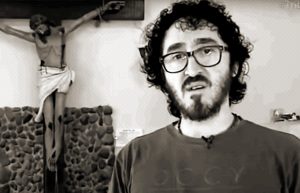

 Elizabeth Kindelmann
Elizabeth Kindelmann Through what became The Spiritual Diary, Jesus and Mary taught Elizabeth, and they continue to instruct the faithful in the divine art of suffering for the salvation of souls. Tasks are assigned for each day of the week, which involve prayer, fasting, and night vigils, with beautiful promises attached to them, laced with special graces for priests and the souls in purgatory. In their messages, Jesus and Mary say that The Flame of Love of the Immaculate Heart of Mary is the greatest grace given to mankind since the Incarnation. And in the not-so-distant future, her flame will engulf the entire world.
Through what became The Spiritual Diary, Jesus and Mary taught Elizabeth, and they continue to instruct the faithful in the divine art of suffering for the salvation of souls. Tasks are assigned for each day of the week, which involve prayer, fasting, and night vigils, with beautiful promises attached to them, laced with special graces for priests and the souls in purgatory. In their messages, Jesus and Mary say that The Flame of Love of the Immaculate Heart of Mary is the greatest grace given to mankind since the Incarnation. And in the not-so-distant future, her flame will engulf the entire world. Father Stefano Gobbi
Father Stefano Gobbi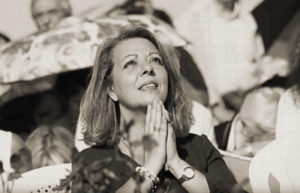 Why Gisella Cardia?
Why Gisella Cardia? Thirdly, the messages have frequently been accompanied by visible phenomena, photographic evidence found in In Cammino con Maria, which cannot be the fruit of subjective imagination, notably the presence of the stigmata on Giselle’s body and and the appearance of crosses or religious texts in blood on Gisella’s arms. See the pictures taken from her apparition website
Thirdly, the messages have frequently been accompanied by visible phenomena, photographic evidence found in In Cammino con Maria, which cannot be the fruit of subjective imagination, notably the presence of the stigmata on Giselle’s body and and the appearance of crosses or religious texts in blood on Gisella’s arms. See the pictures taken from her apparition website 
 Jennifer
Jennifer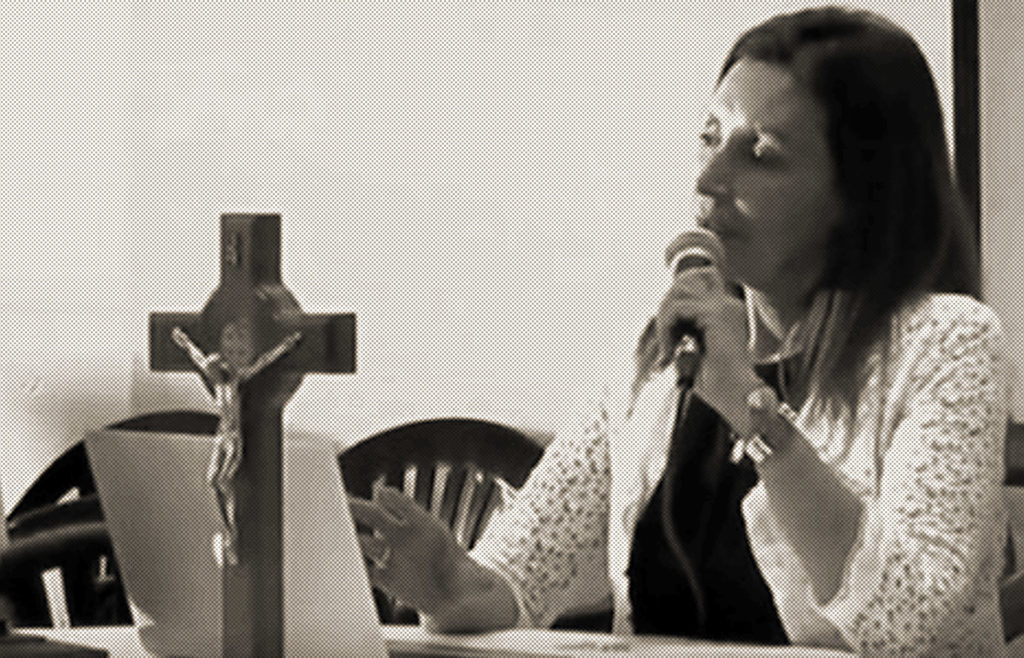
 Why Manuela Strack?
Why Manuela Strack?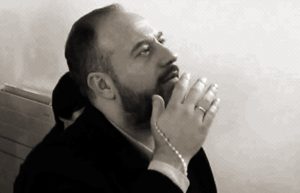

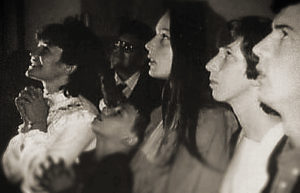 Why the Visionaries of Our Lady of Medjugorje?
Why the Visionaries of Our Lady of Medjugorje? Why Pedro Regis?
Why Pedro Regis? Why the Servant of God Luisa Piccarreta?
Why the Servant of God Luisa Piccarreta? of the saints. It wasn’t until she became a “Daughter of Mary” that the nightmares finally ceased at the age of eleven. In the following year, Jesus began to speak interiorly to her especially after receiving Holy Communion. When she was thirteen, He appeared to her in a vision that she witnessed from the balcony of her home. There, in the street below, she saw a crowd and armed soldiers leading three prisoners; she recognized Jesus as one of them. When He arrived beneath her balcony, He raised his head and cried out: “Soul, help Me!” Deeply moved, Luisa offered herself from that day on as a victim soul in expiation for the sins of mankind.
of the saints. It wasn’t until she became a “Daughter of Mary” that the nightmares finally ceased at the age of eleven. In the following year, Jesus began to speak interiorly to her especially after receiving Holy Communion. When she was thirteen, He appeared to her in a vision that she witnessed from the balcony of her home. There, in the street below, she saw a crowd and armed soldiers leading three prisoners; she recognized Jesus as one of them. When He arrived beneath her balcony, He raised his head and cried out: “Soul, help Me!” Deeply moved, Luisa offered herself from that day on as a victim soul in expiation for the sins of mankind. immobile, rigid-like state that appeared almost as if she were dead. It was only when a priest made the sign of the Cross over her body that Luisa regained her faculties. This remarkable mystical state persisted until her death in 1947—followed by a funeral that was no little affair. During that period in her life, she suffered no physical illness (until she succumbed to pneumonia at the end) and she never experienced bedsores, despite being confined to her little bed for sixty-four years.
immobile, rigid-like state that appeared almost as if she were dead. It was only when a priest made the sign of the Cross over her body that Luisa regained her faculties. This remarkable mystical state persisted until her death in 1947—followed by a funeral that was no little affair. During that period in her life, she suffered no physical illness (until she succumbed to pneumonia at the end) and she never experienced bedsores, despite being confined to her little bed for sixty-four years. Why Simona and Angela?
Why Simona and Angela?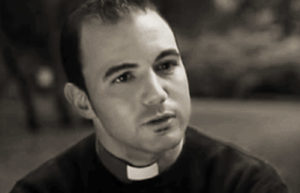
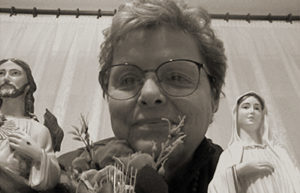 Valeria Copponi
Valeria Copponi